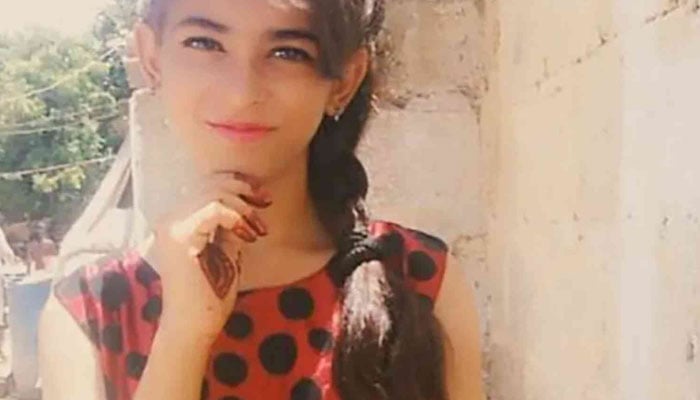‘Women Protection Act overrides federal law allowing under-18 marriage’
A judicial magistrate on Thursday reserved the order on the charge sheet submitted by the police in the case of 13-year-old Arzoo Fatima, who had converted from Christianity to Islam and married a man almost thrice her age.
The Frere police had charged Azhar Ali with forcing a child into marriage and committing rape, and cleric Qazi Abdul Rasool and lawyers Mehmood Hassan and Junaid Siddiqui with facilitating the underage marriage.
District South Judicial Magistrate XXIII Ali Muhammad Dall heard the arguments of lawyers Jibran Nasir and Luke Victor, representing complainant Raja Masih, who is Arzoo’s father. The complainant’s counsels made the argument before the JM that the investigating officer had excluded the section pertaining to the girl’s abduction from the charge sheet.
They said the case attracted seven different sections, including 364-A (kidnapping to murder), 365-B (kidnapping or inducing woman to compel for marriage), 375 (rape), 377 (unnatural offences), 328-A (exposure and abandonment of child under 12 by parent or guardian) and 368 (wrongfully concealing kidnapped person) of the Pakistan Penal Code.
Opposing the defence’s reference of the provisions of the federal and Shariah laws that allow marriage on attaining puberty, they argued that after the promulgation of the Women Protection Act 2016, marriage of any under-18 woman is considered rape, which is a punishable offence.
They said cleric Abdul Shakoor Naqshbandi, who had issued the certificate of conversion to Arzoo, and Qazi Abdul Rasool, who had performed the Nikah on the basis of the fake documents that showed the girl’s age to be 18 years old, were also liable to be punished under the law.
They pleaded that the court direct the IO to include the above-mentioned sections in the charge sheet so that the suspects could be tried properly. In the last hearing, the defence counsels had opposed the inclusion of the sections of rape and the Sindh Child Marriages Restraint Act. The court adjourned the matter until December 7 to pronounce the verdict.
-
 Hailey Bieber's Subtle Gesture For Eric Dane’s Family Revealed
Hailey Bieber's Subtle Gesture For Eric Dane’s Family Revealed -
 Moment Prince William 'broke Down' And 'apologised' To Kate Middleton
Moment Prince William 'broke Down' And 'apologised' To Kate Middleton -
 Paul Mescal And Gracie Abrams Stun Fans, Making Their Romance Public At 2026 BAFTA
Paul Mescal And Gracie Abrams Stun Fans, Making Their Romance Public At 2026 BAFTA -
 EU Rejects Any Rise In US Tariffs After Court Ruling, Says ‘a Deal Is A Deal’
EU Rejects Any Rise In US Tariffs After Court Ruling, Says ‘a Deal Is A Deal’ -
 King Charles Congratulates Team GB Over Winter Olympics Success
King Charles Congratulates Team GB Over Winter Olympics Success -
 Meryl Streep Comeback In 'Mamma Mia 3' On The Cards? Studio Head Shares Promising Update
Meryl Streep Comeback In 'Mamma Mia 3' On The Cards? Studio Head Shares Promising Update -
 Woman Allegedly Used ChatGPT To Plan Murders Of Two Men, Police Say
Woman Allegedly Used ChatGPT To Plan Murders Of Two Men, Police Say -
 UK Seeks ‘best Possible Deal’ With US As Tariff Threat Looms
UK Seeks ‘best Possible Deal’ With US As Tariff Threat Looms -
 Andrew Arrest Fallout: Princess Beatrice, Eugenie Face Demands Over Dropping Royal Titles
Andrew Arrest Fallout: Princess Beatrice, Eugenie Face Demands Over Dropping Royal Titles -
 Rebecca Gayheart Breaks Silence After Eric Dane's Death
Rebecca Gayheart Breaks Silence After Eric Dane's Death -
 Kate Middleton 2026 BAFTA Dress Honours Queen Elizabeth Priceless Diamonds
Kate Middleton 2026 BAFTA Dress Honours Queen Elizabeth Priceless Diamonds -
 Sterling K. Brown's Wife Ryan Michelle Bathe Reveals Initial Hesitation Before Taking On New Role
Sterling K. Brown's Wife Ryan Michelle Bathe Reveals Initial Hesitation Before Taking On New Role -
 BAFTA Film Awards Winners: Complete List Of Winners
BAFTA Film Awards Winners: Complete List Of Winners -
 Millie Bobby Brown On Her Desire To Have A Big Brood With Husband Jake Bongiovi
Millie Bobby Brown On Her Desire To Have A Big Brood With Husband Jake Bongiovi -
 Backstreet Boys Admit Aging Changed Everything Before Shows
Backstreet Boys Admit Aging Changed Everything Before Shows -
 Biographer Exposes Aftermath Of Meghan Markle’s Emotional Breakdown
Biographer Exposes Aftermath Of Meghan Markle’s Emotional Breakdown




